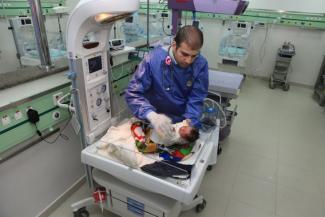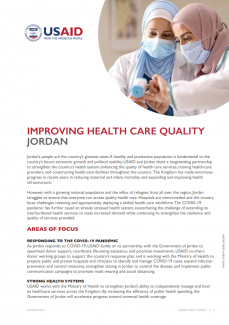BACKGROUND
Jordan’s people are the country’s greatest asset. A healthy and productive population is fundamental to the country’s future economic growth and political stability. USAID and Jordan share a longstanding partnership to strengthen the country’s health system, enhancing the quality of health care services, training health-care providers, and constructing health-care facilities throughout the country. The Kingdom has made enormous progress in recent years in reducing maternal and infant mortality and expanding and improving health infrastructure.
However, with a growing national population and the influx of refugees from all over the region, Jordan struggles to ensure that everyone can access quality health care. Hospitals are overcrowded and the country faces challenges retaining and appropriately deploying a skilled health-care workforce. The COVID-19 pandemic has further taxed an already stressed health system, exacerbating the challenge of extending its overburdened health services to meet increased demand while continuing to strengthen the resilience and quality of services provided.
AREAS OF FOCUS
Responding to the COVID-19 Pandemic
As Jordan responds to COVID-19, USAID builds on its partnership with the Government of Jordan to spearhead donor support, coordinate life-saving assistance, and prioritize investments. USAID co-chairs donor working groups to support the country’s response plan, and is working with the Ministry of Health to prepare public and private hospitals and clinicians to identify and manage COVID-19 cases, expand infection prevention and control measures, strengthen testing in Jordan to control the disease, and implement public communication campaigns to promote mask wearing and social distancing.
Strong Health Systems
USAID works with the Ministry of Health to strengthen Jordan’s ability to independently manage and fund its healthcare services across the Kingdom. By increasing the efficiency of public health spending, the Government of Jordan will accelerate progress toward universal health coverage. USAID builds the ministry’s capacity to utilize systems to track maternal deaths, combat antimicrobial resistance, and monitor continuous professional development for health-care workers. In cooperation with the Ministry of Health, USAID supports private-sector efforts to incentivize health practices that support nutrition and maternal health, and ensures that people have knowledge and resources to achieve healthier outcomes for themselves and their families.
Expanded Health Infrastructure
Critical health facilities in Jordan are underequipped and overcrowded, threatening the quality of health services. To address this challenge, USAID works with the Ministries of Health and of Public Works and Housing to identify and address major infrastructure needs. This includes the expansion of the emergency department of Al Bashir Hospital in Amman, which serves 50,000 patients a month, including some of the most vulnerable in Jordan.
NOTEWORTHY ACHIEVEMENTS
USAID has trained more than 9,000 healthcare providers from public and private health facilities throughout Jordan on how to screen, triage, and care for COVID-19 cases, and more than 1,100 health care workers on how to apply appropriate infection prevention and control precautions to limit the spread of the virus in their facilities.
USAID assessed 34 public, private, and university laboratories that conduct COVID-19 tests to identify logistical and process bottlenecks and develop action plans to streamline testing and facilitate the quality and speed with which tests can be safely and effectively processed.
Since 2002, USAID has renovated and modernized 349 health facilities across the Kingdom, including Princess Rahma Pediatric Hospital, the only pediatric referral hospital for the four northern governorates serving nearly 60,000 children each year.
Jordan is one of the few middle-income countries with reliable, up-to-date data on maternal mortality thanks to Jordan’s Maternal Mortality Surveillance and Response System launched with USAID support. By recording maternal deaths and their causes, the system helps Jordan generate actionable data, enabling decision makers to identify root causes of maternal deaths, implement targeted interventions, and monitor their effectiveness.
In 2019, USAID signed a Joint Financing Agreement with the Governments of Denmark and Jordan, creating a multi-donor account to support the Ministry of Health to provide health services for Syrian refugees in Jordan. Since the signing, USAID has convened additional donors, generating US$ 85 million in funds and $60 million in complementary technical assistance.

USAID Jordan

